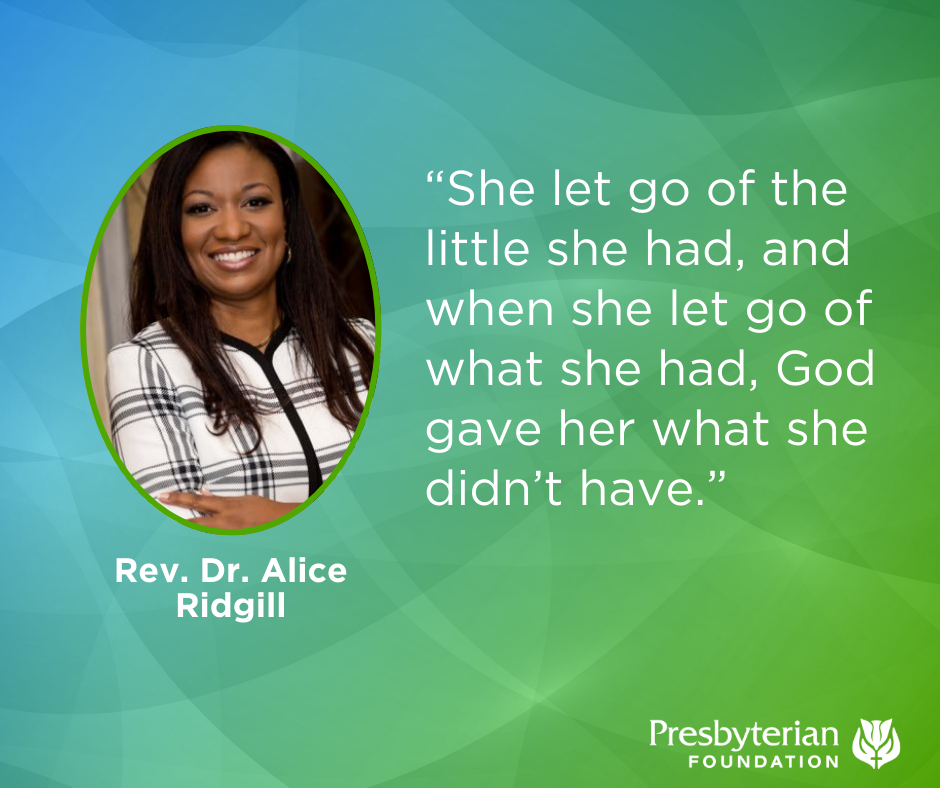10/7/2024
“A Leap of Faith”
by Rev. Dr. Alice Ridgill

1 Kings 17:7-16 (New International Version)
7 Sometime later the brook dried up because there had been no rain in the land. 8 Then the word of the Lord came to [Elijah]: 9 “Go at once to Zarephath in the region of Sidon and stay there. I have directed a widow there to supply you with food.” 10 So he went to Zarephath. When he came to the town gate, a widow was there gathering sticks. He called to her and asked, “Would you bring me a little water in a jar so I may have a drink?” 11 As she was going to get it, he called, “And bring me, please, a piece of bread.” 12 “As surely as the Lord your God lives,” she replied, “I don’t have any bread—only a handful of flour in a jar and a little olive oil in a jug. I am gathering a few sticks to take home and make a meal for myself and my son, that we may eat it—and die.” 13 Elijah said to her, “Don’t be afraid. Go home and do as you have said. But first make a small loaf of bread for me from what you have and bring it to me, and then make something for yourself and your son. 14 For this is what the Lord, the God of Israel, says: ‘The jar of flour will not be used up and the jug of oil will not run dry until the day the Lord sends rain on the land.'” 15 She went away and did as Elijah had told her. So, there was food every day for Elijah and for the woman and her family. 16 For the jar of flour was not used up and the jug of oil did not run dry, in keeping with the word of the Lord spoken by Elijah.
A devotion based on 1 Kings 17:7-16 (New International Version)
She was desperate, disillusioned, and distraught. To make matters worse, she was down to nothing. She is known as the widow of Zarephath, and all she had left was a handful of flour and a little olive oil in a jar. With just enough flour and oil for one last meal, there is no telling what would have happened to her and her son if God had not sent Elijah to Zarephath.
Why Zarephath? Of all the places God could have sent Elijah, why Zarephath? In Hebrew, Zarephath means “refinery”. Is it possible that God sent Elijah to Zarephath, the refining place, to prepare Elijah for the next season of his life? I believe so. In my experience, I’ve discovered that God uses seasons of refining to prepare us for what’s to come in our lives.
To refine something is to strip unnecessary elements from it. Have you ever felt you were being stripped of things you wanted to keep? I certainly have. Perhaps you feel this way now. While it may be unsettling, could what you’re experiencing be a season of refining in which God is lovingly removing things (comfort zones, proclivities, habits, and the like) that won’t serve you well in the next season of your life or ministry? Could God be preparing you for a new endeavor, call, or leadership role? Could God be calling you to do something you’ve never done before and in preparation for what’s next, God is refining you now?

Elijah was refined through a divinely orchestrated encounter with the widow of Zarephath that began with a request for water and bread. Granting Elijah’s request for water was no problem, but his request for bread was a tall order for the widow to fill. The lingering famine had taken a terrible toll on her provisions. The end was in sight, and she said to Elijah, “I don’t have any bread- only a handful of flour in a jar and a little olive oil in a jug. I am gathering a few sticks to take home and make a meal for myself and my son, that we may eat it- and die.” Then, in a refining moment, Elijah said, “Make a small loaf of bread for me from what you have and bring it to me. Then make something for yourself and your son. For this is what the Lord says: ‘The jar of flour will not be used up and the jug of oil will not run dry until the day the Lord sends rain on the land.'”
It did not make sense for the widow to feed Elijah before feeding herself and her son, and perhaps she wondered why such a radical request was made of her. Yet, she did not ask for an explanation. As Medieval theologian Saint Thomas Aquinas rightly noted, “To one who has faith no explanation is necessary. To one without faith, no explanation is possible.” For the widow of Zarephath, no explanation was necessary. She had faith in what Elijah’s God promised, so she did exactly what Elijah asked her to do. She made a small loaf of bread for Elijah first!
In an act of trust and obedience, the widow of Zarephath took a leap of faith. She didn’t know how things would turn out, but she took a leap of faith. She had no backup plan, but she took a leap of faith. It was scary, but she took a leap of faith. She let go of the little she had, and when she let go of what she had, God gave her what she didn’t have. As Elijah said, and as God promised, the jar of flour was never used up and the jug of oil never ran dry until the day the Lord sent rain on the land.
Calligrapher and author Margaret Shepard once said, “Sometimes your only available transportation is a leap of faith.” Is God calling you to take a leap of faith in a certain area of your life? If so, I encourage you to trust God’s call, choose faith over fear, and go for it. There may be great things awaiting you on the other side of the leap.

